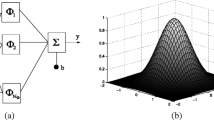Abstract
For most engineering optimization problems, it is difficult to find the global optimum due to the unaffordable computational cost. To overcome this difficulty, a new sequential approximate optimization approach using radial basis functions is proposed to find the global optimum for engineering optimization. In the approach, the metamodel is constructed repeatedly to replace the expensive simulation analysis through the addition of sampling points, namely, extrema points of response surface and minimum point of density function. Optimization algorithms simulated annealing and sequential quadratic programming are employed to obtain the final optimal solution. The validity and efficiency of the proposed approach are tested by studying several mathematic examples and one engineering optimization problem.
Access this chapter
Tax calculation will be finalised at checkout
Purchases are for personal use only
Preview
Unable to display preview. Download preview PDF.
Similar content being viewed by others
References
Gu, L.: A comparison of polynomial based regression models in vehicle safety analysis. In: ASME Design Engineering Technical Conferences-Design Automation Conference, pp. 9−12. ASME Press, Pennsylvania (2001)
Regis, R.G., Shoemaker, C.A.: A stochastic radial basis function method for the global optimization of expensive functions. Informs Journal on Computing 19, 497–509 (2007)
Jin, R., Chen, W., Simpson, T.W.: Comparative studies of metamodeling techniques under multiple modeling criteria. Struct. Multidisc. Optim. 23, 1–13 (2001)
Park, J., Sandberg, I.W.: Universal approximation using radial basis function networks. Neural Computing 3, 246–257 (1991)
Wang, G.G., Shan, S.: Review of metamodeling techniques in support of engineering design optimization. J. Mech. Des. 129, 370–380 (2007)
Babu, G.S., Suresh, S.: Sequential projection-based metacognitive learning in a radial basis function network for classification problems. IEEE Transactions on Neural Networks and Learning Systems 24, 194–206 (2013)
Rashid, K., Ambani, S., Cetinkaya, E.: An adaptive multiquadric radial basis function method for expensive black-box mixed-integer nonlinear constrained optimization. Engineering Optimization 45, 185–206 (2013)
Vuković, N., Miljković, Z.: A growing and pruning sequential learning algorithm of hyper basis function neural network for function approximation. Neural Networks 46, 210–226 (2013)
Kitayama, S., Arakawa, M., Yamazaki, K.: Sequential approximate optimization using radial basis function network for engineering optimization. Optimization and Engineering 12, 535–557 (2011)
Kitayama, S., Srirat, J., Arakawa, M.: Sequential approximate multi-objective optimization using radial basis function network. Structural and Multidisciplinary Optimization 48, 501–515 (2013)
Hardy, R.L.: Multiquadric equations of topography and other irregular surfaces. Journal of Geophysical Research 76, 1905–1915 (1971)
Micchelli, C.A.: Interpolation of scattered data: distance matrices and conditionally positive definite functions. Constructive Approximation 2, 11–22 (1984)
Krishnamurthy, T.: Response surface approximation with augmented and compactly supported radial basis functions. In: 44th AIAA/ASME/ASCE/AHS/ASC Structures, Structural Dynamics, and Materials Conference, pp. 3210−3224. AIAA Press, Virginia (2003)
Gu, J., Li, G.Y., Dong, Z.: Hybrid and adaptive meta-model-based global optimization. Engineering Optimization 44, 87–104 (2012)
Wang, L.Q., Shan, S., Wang, G.G.: Mode-pursuing sampling method for global optimization on expensive black-box functions. Engineering Optimization 36, 419–438 (2004)
Coello, C.C.A.: Use of a self-adaptive penalty approach for engineering optimization problems. Computers in Industry 41, 113–127 (2000)
Ray, T., Saini, P.: Engineering design optimization using swarm with an intelligent information sharing among individuals. Engineering Optimization 33, 735–748 (2001)
Author information
Authors and Affiliations
Corresponding author
Editor information
Editors and Affiliations
Rights and permissions
Copyright information
© 2015 Springer International Publishing Switzerland
About this paper
Cite this paper
Ye, P., Pan, G., Huang, Q., Shi, Y. (2015). A New Sequential Approximate Optimization Approach Using Radial Basis Functions for Engineering Optimization. In: Liu, H., Kubota, N., Zhu, X., Dillmann, R. (eds) Intelligent Robotics and Applications. Lecture Notes in Computer Science(), vol 9246. Springer, Cham. https://doi.org/10.1007/978-3-319-22873-0_8
Download citation
DOI: https://doi.org/10.1007/978-3-319-22873-0_8
Publisher Name: Springer, Cham
Print ISBN: 978-3-319-22872-3
Online ISBN: 978-3-319-22873-0
eBook Packages: Computer ScienceComputer Science (R0)




